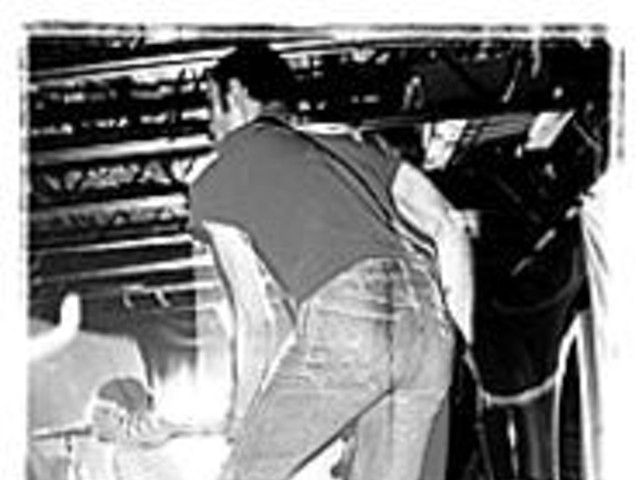The members have all kept busy in recent years. Bassist Graham Maby has played with Natalie Merchant, They Might Be Giants and several Jackson projects. Guitarist Gary Sanford has toured and recorded with Joan Armatrading and Aztec Camera, among others. Jackson has been busiest of all, with eleven albums (four on Sony Classical, including the Grammy-award winning Heaven and Hell), two soundtracks and several live compilations, not to mention a well-received musical memoir, A Cure for Gravity. When asked about the guiding principles behind his prolific, eclectic career, Jackson is refreshingly unpretentious. "I've always known I was in this for the long haul and I've certainly outlasted a lot of critics," he says. "I've always been determined to do what I want, to have fun, to succeed. I put having fun at the top."
When critics and some fans looked askance at Jackson's forays into genre-bending work, Jackson held his own course. "Success is something that you have to have your own definition of, and you have to be clear about what your own definition is," he explains. "To be successful is to continue doing what I love and getting better at it and having enough money to pay the rent. That's all I ever hoped for when I started out. People get caught up in other's definitions of success, and to get too caught up in the definition of success that maybe a record company would have would be very dangerous for an artist."
Although Jackson has never been able to shake the oft-repeated and inaccurate label of Britain's angriest young man, he sees a pervasive humor in his projects. "It is amazing to me that people consistently miss the humor in what I do and somehow mistake it for cynicism or vitriol," he says. "I'm very often accused of being overly serious, and it's just amazing to me because it's in fact the other way around; I'm taken much more seriously than I intend to be."
Jackson also points to his romantic approach, a sensibility that imbues his ballads with a bittersweet mood: "I'm quite romantic in my songs but not in a way that's sentimental because too much sugar makes you sick. You've got to balance the sweet and sour." The battle of the sexes, with its ironies and contradictions, is a constant in Jackson's oeuvre.
The new album doesn't come off as a time capsule, but its opening beats capture a sound instantly recognizable to fans: ska-infused drums, rapid piano riffs, razor-sharp lyrics: "Don't let her down/Just 'cause you could before/She stole the crown/You don't rule anymore." The songs evince the maturity of a quarter-century's experience--lyrics and arrangements are more complex but don't stifle the sheer pop exuberance of many of the tunes.
Of course, "pop" is a word that sets many on edge, including Jackson. "The definition of 'pop' is something that everyone seems to assume is understood: 'This is a pop record, and that isn't.' But when you start to try to define it, you end up going round in circles and you realize it is actually pretty meaningless. I would say that pretty much everything I've done is pop in an eclectic kind of way, but if you do something that is sort of borderline it gets taken out of the pop category and placed somewhere else, even if that somewhere is wildly inappropriate, like classical."
Categories aside, Volume 4 is a strong collection of songs built around bass and drum lines and punctuated by sometimes frenetic keyboards; the lyrics, predictably, are smart and ironic, riddled with double-entendres and sardonic probing. "Awkward Age," the record's first UK single, describes the lingering effect of adolescent insecurities. The fifteen-year-old addressed by the song's narrator now suffers when "the cool parties never let you in/I can still relate to being left so high and dry/Don't cry/You're just at an awkward age." Although older and, presumably, wiser, the narrator still lacks the ability to comfort because, as he explains, "I get into the parties but hate them 'cause I'm shy." The teen and the 50-year-old both seem equally awkward, bewildered by a popular culture that feeds on their fears. The album opens with several punchy tunes before easing listeners into some of the best melodies Jackson has written in years. He admits the album demonstrates how far he's come as a lyricist. "I'm very confident in this album and would put it alongside anything I've done," he says. "The songs are more honest, more from the heart, more well-crafted, less clichéd. Just more grown up."
Indeed, Jackson seems to be moving away from angst and cynicism, attempting instead to forge connections that might combat the vacuity of modern life. "Love at First Light," a morning-after song, wonders if "maybe there's room for more laughter/'Cause just for a moment I almost believe/In love at first light"; elsewhere in the song, he confesses that "maybe I'm moonstruck, or maybe naïve/But I know there's a God and a Devil."
Reports from the tour have been consistently positive. Audiences have responded with raucous enthusiasm to shows that mix old with new, seamlessly eliding the passage of time. The reunited band's success is no surprise, really: Jackson didn't even try to replace Houghton when he left 25 years ago because the band had such great chemistry; they haven't lost it in the intervening years. It's clear that Jackson and his mates have had a great time being back together: His arrangements encourage them to play against each other in unexpected ways, keeping the tempo high and creating a surprisingly fat sound. Jackson's personal code should usher in fans eagerly awaiting Saturday night's performance: "Expect nothing but be ready for anything."





